Friday Feb 20, 2026
Friday Feb 20, 2026
Thursday, 21 January 2021 00:20 - - {{hitsCtrl.values.hits}}
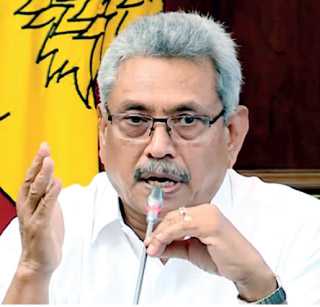
President Gotabaya Rajapaksa
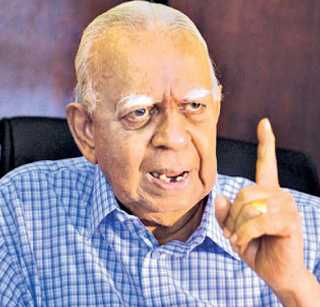
TNA Leader R. Sampanthan
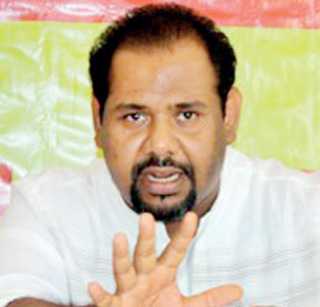
TNPF Leader Gajan Ponnambalam

TMTK Leader C.V. Wigneswaran
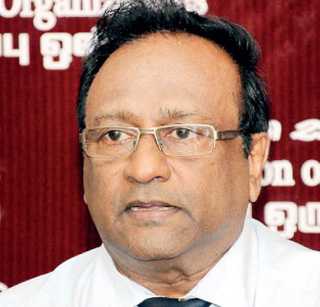
Minister Sarath Weerasekara

PM Mahinda Rajapaksa
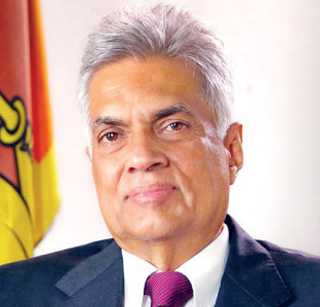
Former PM Ranil Wickremesinghe
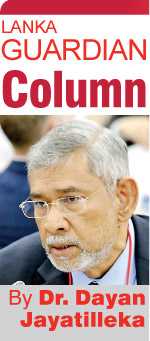 The ‘G word’ is out of the bottle and it doesn’t stand for ‘genie’.
The ‘G word’ is out of the bottle and it doesn’t stand for ‘genie’.
President Gotabaya Rajapaksa is often accused of widening the fissures between the constituent communities in Sri Lanka. However, it must now be ungrudgingly acknowledged that he has achieved what no Tamil leader could, acting as an effective unifying factor within and between the politically splintered Tamil communities in Sri Lanka, Tamil Nadu and the diaspora.
That multiple-miracle is evidenced by (1) a unified Tamil stand (barring the EPDP), bringing together the respected senior personality R. Sampanthan, Leader of the TNA, with his rivals Gajan Ponnambalam and C.V. Wigneswaran and (2) a chorus of diverse political voices from the Tamil Nadu mainstream, decrying the smashing of the Mullivaikkal monument and the regime’s indicated intention to roll-back the 13th Amendment.
President GR has (a) unified the fragmented post-election Tamil political spectrum (b) created a ‘Tamil-speaking’ bloc of Tamil and Muslim politicians (on the mandatory cremation and the Mullivaikkal monument issues) and (c) reactivated the rear-base of Sri Lankan Tamil nationalism across the Palk Straits in Tamil Nadu.
He is the father of the contemporary renaissance of political pan-Tamilism.
Discourse shift to ‘genocide’
The common or consensual stand of the Tamil leaders is manifested in a joint letter they have submitted to the member states of the United Nations Human Rights Council (UNHRC) in Geneva, through the ambassadors. It calls for the outright internationalisation through the United Nations, of the issue of accountability, and specifies certain mechanisms.
The letter breaks a still more important barrier.
The moderate, mainstream TNA had never before agreed to sign off on any text that mentioned the need to investigate allegations of the ‘crime of genocide’—a wholly ludicrous charge—against the Sri Lankan state. The G-word had been the preserve of the organised lobbies of the Tamil Diaspora (there too, not all) and the more radical nationalist elements in Tamil politics on the island. Now, for the first time, R. Sampanthan heads the signatures on the letter which explicitly calls for, among other things, an ‘escalation’ to international accountability mechanisms to investigate allegations of ‘genocide’, apart from the standard allegations of war crimes and crimes against humanity committed during the war.
It is almost certain that the charge of ‘genocide’ will not be echoed by any member state or the UN High Commissioner for Human Rights. Not even Zaid al-Hussein used the G-word. This letter is way over the top, because the Tamil parties do not seem to have grasped the lesson of the George Floyd solidarity campaign or the cold case of the El Salvador’s murdered nuns: focus not on the generic but on the assimilable, manifestly demonstrable (leaving no reasonable doubt of the fog of war), human-scale crimes which evoke pathos and cry out for justice.
Since the war has been over for over a decade and the TNA never joined in asking that the crime of genocide be investigated until now, the shift in the Tamil position is significant. Firstly, it was impossible to get all these quarrelsome Tamil leaders together, let alone have them agree on anything. Secondly, up until a few weeks ago, their drafts were colliding into each other like dodgem cars, with no one ready to sign up to what the others said.
All that suddenly changed with the actions of the Gotabaya regime: Minister Sarath Weerasekara’s solemn pledge to abolish the 13th Amendment and the PC system; the decision that the elections to the Provincial Councils would not be held until a new Constitution and electoral system were in place; the crass, ‘canine cadaver’ reference to Prabhakaran’s death (which President Mahinda Rajapaksa never made and never would); and the overnight destruction of the Mullivaikkal monument (which had neither weapons-replicas nor LTTE symbols) at the Jaffna university. 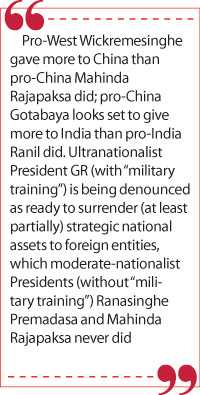
The winds of reactive emotion that swept the Tamil community and the wave of solidarity from political figures overseas, ranging from Chennai through London to Toronto, made the rival Tamil political party leaderships click into place and sign a document that only the radical Tamil nationalists had initially agreed to, that too, having quarrelled over. Sampanthan himself decided to sign.
The text of the letter signed by Sampanthan et al., makes the chain of causation clear:
“…It is now time for Member States to acknowledge that there is no scope for a domestic process that can genuinely deal with accountability in Sri Lanka. The continuing and intensifying oppression against the Tamils including militarisation, indefinite detention of political prisoners, land grab in the name of archaeological explorations, the denial of traditional, collective land rights like cattle grazing rights, intensifying surveillance of political and civil society activists, the denial of burial rights during COVID19 to our Muslim brethren and the denial of the right to memory underscore the urgency of addressing the deteriorating situation.”
Having been pushed around at every turn by the regime, and perceiving an existential threat of majoritarian, militarised, de-facto apartheid, the Sri Lankan Tamil leaders decided to leverage their sole advantage: the global Tamil community, its enhanced profile and emerging importance in society and politics from the USA to New Zealand. That required getting on the same page as the organised Diaspora, which meant embracing its slogans of ‘genocide’ and international accountability.
Meanwhile the Governor of the Eastern Province, Anuradha Yahampath, who publicly advocated (Viyath Maga, Gampaha 2018) the oral insertion of gun-barrels in certain cases of politically deviant opinion, has “appointed an expert committee to study…in depth complaints, requests or appeals from the public regarding the development of coexistence among communities, review information and make appropriate recommendations.” (The Island)
Given the demographic balance of the east, one awaits the experts’ committee’s composition, but the more important question is this: what if a Tamil governor of a Tamil-majority province or a Sinhala-majority province, or a Tamil or Muslim Governor of the Eastern Province itself, appointed an “expert committee” with a mandate of exactly the same wording as that appointed by Governor Yahampath?
The Sunday Times Political column discloses that the Presidential Secretariat was unaware of the demolition of the Mullivaikkal monument until it had taken place and Prime Minister Mahinda Rajapaksa had contacted the Secretariat to convey Delhi’s alarm as communicated to him by the Indian High Commissioner after the Tamil Nadu backlash. It also says the Vice-Chancellor indicates that the pressure on him came from the Law and Order and defence/military authorities.
Who then is driving policy, including measures that put pressure on Delhi, causing it to assert itself?
Anarchy and ethnic militia
Though there may well be reasonably credible allegations of ‘atrocities’, ‘war crimes’ and ‘crimes against humanity’ committed by both sides during the Long War (the LLRC Report highlighted some dark, distressing episodes), there was nothing remotely approaching ethnic cleansing, still less genocide. However, given “the urgency of the deteriorating situation” (Tamil Joint Letter) that doesn’t mean there is no such danger in the future.
What if, in July 1983, every Sri Lankan aged 18 and over had mandatory military training, as in (former) Yugoslavia?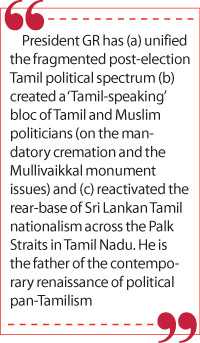
Sri Lanka fought and defeated the LTTE with an all-volunteer professional army. Why then does Minister Sarath Weerasekara declare: “We must provide military training for young men and women above 18 years of age. This is why I will table this proposal in Parliament.” (Daily Mirror 18 January 2021)
The Minister opined that “It’s with military training that a man can learn to stand up straight and look a person in the eye. It builds personality, and instills leadership qualities…” (EconomyNext) This is arrant, proto-fascist nonsense. Was it “with military training” that D.S. Senanayake, Ranasinghe Premadasa, Mahinda Rajapaksa and Lakshman Kadirgamar learned to “stand up straight and look a person in the eye”, “build personality” and develop “leadership qualities…”?
Who is Weerasekara gearing up to fight? Who is going to pay for the huge burden on the budget? What if young people do not wish to be subject to military discipline, taken away from home, family and friends? Will they be taken away involuntarily? How would this be different from the LTTE’s forced conscription? Will all Sinhala, Tamil and Muslim men and women of 18 and over be given military training? What of the risks of military training enhancing recruitment to criminal gangs, extremist militias or terrorist organisations?
In a country with ethnic/ethno-religious fault-lines, and an overwhelming demographic asymmetry (75% Sinhala), will mandatory military service for youth over 18 not create the conditions for mass atrocities and ethnic cleansing as in former Yugoslavia or genocide as in Rwanda?
Does the citizenry prefer indubitably strong leaders without “military training” such as D.S. Senanayake, Sirima Bandaranaike, Ranasinghe Premadasa and Mahinda Rajapaksa, or someone like Sarath Weerasekara—”with military training” -- as a leader?
Sinophobia to Sinophilia
The economic and external policy of the previous Government was driven by Prime Minister Ranil Wickremesinghe. Filled with hubris, he pulled the plug in early 2015 on the Port City and the Chinese projects in general, expecting the West and India to reward him by picking up the slack. He did not understand the reality of the shifts in the world economy, the Asian economy and the Sri Lankan economy.
Only the Chinese had the surplus capital (as did Japan in the 1980s) and were ready, willing and able to inject it. The Sri Lankan growth rate was powered by the Chinese projects. When the projects were arbitrarily stopped, two things happened which eventually constituted the two blades of a pair of scissors. The bills for discontinuance kept adding up while the rate of economic growth which made repayment possible kept moving down.
Finally, the economic reality was explained to Ranil Wickremesinghe by Dr. Indrajit Coomaraswamy. The Wickremesinghe administration then went on a penitent pilgrimage to China. Where it was shown the bill. China’s disposition wasn’t sweetened by the gratuitous remarks about investigating Chinese business practices, made by the UNP Foreign Minister at a media briefing at the Sri Lanka Embassy in Beijing in 2015. (Lakshman Kadirgamar would’ve been appalled.)
When the costs of having pulled the plug on the Chinese projects proved manifestly unpayable, Dr. Sarath Amunugama broke it gently to Prime Minister Wickremesinghe that there was only one option: cough up the Hambantota Port. When the Chinese side was still hanging tough, the GoSL topped up the offer, adding a considerable area around Hambantota harbour.
Given the enlarged Chinese footprint, it is entirely understandable that India should strive to enlarge its own in Sri Lanka. Hence the ECT issue. It would be inaccurate however, for the Gotabaya Rajapaksa administration to place the entire blame at the door of Prime Minister Wickremesinghe. President GR took a bad situation created by Wickremesinghe and made it far worse by a quantum jump in the political relationship with China, qualitatively beyond what it had been from the days of S.W.R.D. Bandaranaike to Mahinda Rajapaksa. Inevitably the threat-perceptions of India and the USA were heightened.
The cancellation of the Japanese light-rail project enhanced these perceptions. Though President GR gave the trade union leaders a brief lecture on geopolitics, it is he, not they, who grossly transgressed geopolitical good sense.
ECT: The Ranasinghe Premadasa option
As an intensely intelligent economist of Sri Lankan origin (whom I first met in the 1980s), Professor Howard Nicholas, based in Europe and a visiting professor in Vietnam, repeatedly emphasised to Colombo audiences during the years of Ranilonomics, the East Asian success story entailed (as he buttressed with case-studies) the national retention, i.e., non-relinquishment, of strategic national assets to non-national (and in some cases, non-state) actors.
In complete contradistinction to President Gotabaya Rajapaksa, when President Premadasa was confronted with a hugely loss-making plantation sector, urged to stop the drain on the exchequer and recapitalise by privatisation of ownership and sale to foreign companies, he deliberated on the problem and typically arrived at a principled yet creative decision. Ruling-out the sale of ownership of any part of the estates to foreigners and even local corporates, he introduced instead the formula of renewable (performance-based) five-year management contracts to Sri Lankan companies. Ironically, it was Chandrika who sold off, including to foreign companies from competitor countries, the estates that her mother had nationalised.
The President’s ECT decision may not leave his principal patron, China, entirely happy. He will now have to compensate for his lurch towards India by enhancing or entrenching a larger Chinese footprint, for which he will have to further compensate its rivals, eventually leaving Sri Lanka a ‘semi-colony’, a term used by Mao Zedong to describe pre-revolutionary China, carved up by several imperial powers, not ruled by one.
Patriotism or ultranationalism?
Apart from avoiding excessive dependence on China, a dependence which he consciously cultivated, there was something other than the ECT that President Gotabaya could have traded-in with far less national consequence. One of China’s most outstanding diplomats and a UN Under Secretary-General (now retired), Ambassador Sha Zukang taught me a strategic principle in warmly friendly chats in Geneva and Lisbon, which he wanted me to convey to President Mahinda Rajapaksa and I duly did over lunch, flying into Colombo.
The veteran Chinese diplomat who remembered me as a (“thin”) young man during his stint as ambassador in Colombo (before moving on to Geneva and New York, where he famously crossed swords with US Ambassador John Bolton) told me he had given the same message to my counterpart in New York at the time, Ambassador Kohona, and President MR confirmed to me that the message had indeed reached him.
The message (in the star Chinese diplomat’s own words) was this: “correctly identify your core strategic interests and defend them uncompromisingly, but differentiate correctly between core interests and other interests which are not core strategic interests, and be flexible enough to compromise and concede on the latter.” Ambassador Sha Zukang was talking about President Mahinda Rajapaksa and his troika’s commitments to India over post-war devolution (which Dr. Jaishankar noted).
The recent statement of the visiting Indian External Affairs Minister Dr. Jaishankar contains a checklist. There was another item on it that President GR could have conceded on, which is of far less strategic sensitivity than a terminal in a vital port. That was the 13th Amendment. That amendment is part of a status-quo of long-standing and has a large chunk of support in the Cabinet and ruling coalition. (Prime Minister Mahinda Rajapaksa attempted to kick-start a process of holding elections to the Provincial Councils under the existing framework).
Ultranationalist supremacism finds provincial devolution a far more bitter pill to swallow than a foreign footprint on strategic national assets. That is the difference between ultra-nationalism and patriotism.
Pro-West Wickremesinghe gave more to China than pro-China Mahinda Rajapaksa did; pro-China Gotabaya looks set to give more to India than pro-India Ranil did.
Ultranationalist President GR (with “military training”) is being denounced as ready to surrender (at least partially) strategic national assets to foreign entities, which moderate-nationalist Presidents (without “military training”) Ranasinghe Premadasa and Mahinda Rajapaksa never did.